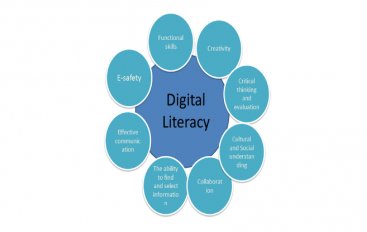2021 Work Trends: Is Data Literacy A Key Skillset For Indian Professionals In The Post Pandemic Age?




The year 2020 will be remembered as the year that changed everything – human behaviour, consumer preferences, market dynamics, the way businesses operate. We see proof of this change in how we go about our daily tasks. Physical office spaces and meetings have been replaced by virtual video conferences and digital workplaces. The traditional 9-to-5 schedule has been replaced by remote working and ‘work from home’ protocols. In a world already digitising before the pandemic, the outbreak has significantly accelerated the pace of this transformation.
In this ‘new normal’ of the global business landscape, organisations of all sizes are depending on SaaS and cloud-based platforms to carry out their daily operations in as seamless a manner as possible. This digital shift has also led to a data explosion and to not let data go to waste, enterprises need a strong and data literate workforce.
The new normal: data as the new oil
Data is the new oil, the fuel that powers modern enterprise operations. Why? Because the insights that it provides drive more informed and accurate decision-making. Organisations armed with such insights can not only react better to expected and unexpected developments but can also proactively plan for long-term business contingencies.
However, before the pandemic, access to enterprise data was largely limited to C-suite executives, top managers, and in-house analytics teams. Business users looking to access enterprise data had to requisition insights from a centralised DataOps centre, which would prioritise and provide the needed information as per the demand.
With the pandemic, however, this model has become outmoded. Flexible, remote working processes have made it critical to make relevant data available to business users at their point of decision. As a result, we are witnessing a major shift towards embedded analytics and conversational analytics that enables professionals across the board to self-service their queries as if they were chatting with a colleague.
The only challenge? The end-user must know how to read, interact with, and make sense of the data presented to extract the optimum value.
Why data literacy is rapidly becoming a non-negotiable skill set for professionals and organisations
In today’s digital-first world, the absence of this knowledge can be crippling for both the individual and the organisation. Professionals who are not comfortable with data are a weak link in any organisation’s data analytics pipeline. Such a gap-ridden data analytics pipeline results in inadequate or unreliable insights, defeating the entire purpose of digital transformation.
Poor data literacy also impacts the employability of new-age professionals. According to a recent study entitled NTUC LearningHub Data Skills Report, 89% of employees felt that they faced challenges at work because they weren’t data literate enough. The study also highlighted how employees saw poor data literacy as a handicap to their career progression, feeling that it could see them fall behind their peers in terms of work performance, not be promoted as often, and become less useful to their companies.
The need for strong data literacy becomes more pronounced when we view the other side of the data divide. Various industry reports, including those by The Data Literacy Project and Qlik, have highlighted how data literate employees are more confident in their decision-making, make more accurate decisions, and generally perform better in their roles than their non-data literate peers. In short, data-literate employees can survive and thrive better amidst the current market turbulence – and, by extension, can help their organisations do the same. Empowered by insights that only data can provide, they can help organisations react better to expected and unexpected developments, as well as proactively plan for contingencies to ensure more seamless business continuity. A healthy data pipeline augmented by a data-ready culture can help businesses to empower their employees and extract the best out of their employees. We will conclude with another data point: according to a report by DataCamp, nearly one in 10 companies are prioritising data skills within their workforce. This means that recruiters are more likely to actively seek more data literate professionals during any new hiring drives. It also means that business leaders are going to focus on improving the data literacy levels within their organisations, across the board – from the C-suite to the junior-most employee. By deploying modern data and analytics pipeline to harness raw data and translating them into enterprise-ready intelligence, organizations stand to gain a competitive advantage in the post-pandemic market. The signs are clear - as business ecosystems are preparing for smarter use of data, are you ready?